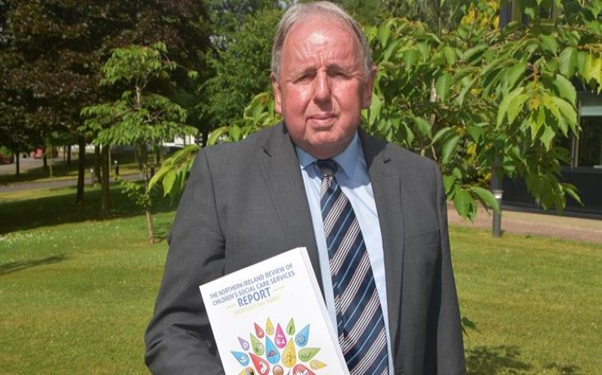
By Ray Jones
The report of the Independent Review of Northern Ireland’s Children’s Social Care Services was published in June, following 16 months’ work.
As the independent reviewer, I had the privilege of meeting many hundreds of children and young people, parents and other family carers, and those working within and alongside children’s social care during this time.
Their contributions heavily shaped the review’s conclusions and recommendations, including the following seven key messages.
Doing the basics well
The first is the importance of what might be termed ‘doing the basics well’. This is about being reliable and respectful. It is about keeping to commitments and promises. It is about responding in a timely way to phone messages, emails and correspondence. It is about being trustworthy.
This is important because it sets the tone of relationships. It demonstrates care and concern rather than disregard and disrespect. It is not rocket science – but it is sometimes difficult when practitioners are stretched and overly busy.
The Northern Ireland review also noted the importance of senior managers ‘looking down and out’ more than ‘up and in’.
This means staying close to, and informed about issues in frontline practice (‘looking down’) and being in contact with those who use services (‘looking out’).
The time for looking ‘down and out’ can be squeezed by the demands of ‘looking in’ to the corporate centre of the organisation and ‘looking up’ to the Department of Health.
Providing families with stability
The second message is the importance of stability and continuity. The constant churn of workers leads to children and families, and colleagues, not building trust or shared understandings and knowledge.
The disruption leads to confusion and inconsistency, with differing expectations being set for families by a conveyor belt of workers who have a limited grasp of a family’s history or of previous contacts and discussions.
This is about workforce stability but also about service structures. Moving children and families between teams as their contact with services continues or develops creates an organisational imperative which is itself damaging and disruptive.
It is not possible to provide service stability and strong positive cultures if there is heavy reliance on agency social workers; Northern Ireland has already taken action to curtail their use in its statutory social services.
The Northern Ireland review also recommends that whilst retaining initial assessment intake teams, children and families should then be assisted by community social work-led multi-disciplinary teams, who stay with them.
This would avoid the disruption of enforced handovers between teams, managers and workers when, for example, children and young people move in and out of care or if a child protection plan is initiated or ended.
The importance of practical help
Third, the review emphasises the importance of practical help and befriending. Parents, often mothers, may be isolated and overwhelmed by poverty and anxiety. Parents of disabled children who need constant care may be exhausted.
Families highlighted to me the value and importance of practical help, such as helping sort out bills and benefits, sorting out repairs to cookers and other household equipment, being an advocate with other agencies on behalf of families and arranging respite and shared care.
These might not be tasks and contributions which always require an experienced social worker, so the skills mix within teams and services is important.
A recommendation in the Northern Ireland review, which is already being actioned, is for a greater skills mix within children and families teams. This means including family support workers, social work assistants, contact supervisors and additional administrative colleagues within teams.
It also involves greater investment in voluntary and community services, such as Sure Start, Home Start and family centres with an expanded age range, and in respite care for families with a disabled child.
Offering continuity of care
Fourth, for some families, poor housing, little support from others, the continuing grind of the stressful, overwhelming challenges of getting through the week or the threat from estranged former partners, mean that longer term help may be needed.
Short-term, time-limited, task-focused interventions may have an impact but then leave the family stranded again when they hit the cliff edge of services and contact ending. There needs to be the opportunity for continuing care and support within the local network of statutory and voluntary services.
This message is behind the Northern Ireland review’s recommendation for community-based, located and focused children and families teams, along with further investment in local community and voluntary sector services.
This would enable continuing, often low key, contact with families who need longer term help and befriending, as well as it being more possible to identify and link children and families with resources and caring people within neighbourhoods.
A trusted ally for children in care
Fifth, for children and young people, coming into care is itself a traumatic and frightening experience, no matter how necessary and how well handled. Young people spoke about the importance of knowing they can keep contact with siblings, wider family, and friends.
They also wanted to have the opportunity to be able to identify, and for it to be noted and recognition to be given to, someone they trusted and who might maintain contact with them for the longer term. It might be the parents of a friend, a teacher or someone else who has been kind, caring and supportive.
This is one of the recommendations in the Northern Ireland review.
The value of peer support
Sixth, I observed, and young people and parents spoke about, the special contribution which can be made by peers who had had or were having similar experiences.
This means young people in care, families meeting at Sure Start and family centres, and parents of disabled children (and disabled children themselves) being beside each other and supportively sharing experiences and knowledge about services and problem-solving.
Northern Ireland already has a strong region-wide and locally accessible organisation, the Voice of Young People in Care (VOYPIC), for young people in care. The Northern Ireland review report noted that it has ‘wise and wonderful’ staff, some of whom are care experienced.
During the review, VOYPIC recruited a reference group of care experienced young and others who had experience of children’s social care and, along with the Cedar Foundation, assisted in the review’s engagement with disabled children and young people.
The Northern Ireland review, with the help of Children in Northern Ireland (CiNI), also had extensive engagement with parents and other family carers. Parents are brought together by organisations such as Autism Northern Ireland and Mencap, and local groups of parents and carers are facilitated by Northern Ireland’s health and social care trusts, by voluntary organisations, and by Sure Start and family centres.
However, the availability and access for parents and other family carers to peer and mutual help groups and services is patchy and partial. There is a review recommendation that this needs to be addressed across the region.
Moving away from a child protection focus
Seventh, and in some ways underlying so much else, there was the fear that services had become overwhelmingly focused on child protection and help only given when it was framed and seen as a child protection issue.
This was expressed by some young people, but especially by parents, including young parents who were care experienced, parents of disabled children, adopters and mothers who had experienced domestic violence.
Social workers and others (including within non-statutory sectors) gave many examples where this was not so, but also recognised how capacity and time did not enable them to match what might be helpful.
A single social care agency for NI
A major recommendation from the Northern Ireland review is that there should be a region-wide statutory children’s social care agency across the relatively small geographical and population size of Northern Ireland. This would provide the focus and attention which is needed for children’s social care services.
There is also the recommendation that this organisation should deliver on the statutory requirement of the 1995 Children Order (Northern Ireland) to help children in need and their families and, when necessary, to protect and care for children.
This requires addressing the increasing tendency, over the past decade, for families to be subjected to intrusive and threatening child protection investigations, many of which then lead to no further action or help.
The next stage, this autumn, is for a public consultation on the review’s recommendations, to inform the action necessary and to be taken when there is a functioning political assembly and executive back at work in Northern Ireland.
Dr Ray Jones is emeritus professor of social work at Kingston University and St George’s, University of London, and has over 50 years’ experience as a social worker, manager, academic and researcher. He led the Independent Review of Northern Ireland’s Children’s Social Care Services in 2022-23.




 Assistive technology and dementia: practice tips
Assistive technology and dementia: practice tips  A trauma-informed approach to social work: practice tips
A trauma-informed approach to social work: practice tips 




 Find out how to develop your emotional resilience with our free downloadable guide
Find out how to develop your emotional resilience with our free downloadable guide  Develop your social work career with Community Care’s Careers and Training Guide
Develop your social work career with Community Care’s Careers and Training Guide  ‘Dear Sajid Javid: please end the inappropriate detention of autistic people and those with learning disabilities’
‘Dear Sajid Javid: please end the inappropriate detention of autistic people and those with learning disabilities’ Ofsted calls for power to scrutinise children’s home groups
Ofsted calls for power to scrutinise children’s home groups Seven in eight commissioners paying below ‘minimum rate for home care’
Seven in eight commissioners paying below ‘minimum rate for home care’
 Facebook
Facebook X
X LinkedIn
LinkedIn Instagram
Instagram
These were the conclusions that a whole raft of research done in 1990s commissioned by the D.O.H when it was responsible for social services. There was a shift away from concentrating all resources into child protection. This was then ended by the austerity measures in the late ‘noughties’. I did my training in the 80s when there had been some research in the 70s regarding teenagers and even then ‘preventative’ services was seen as the may forward. Unfortunately the first thing that happens when the government has no money is to cut services. We have now got to the bone! Reorganising services is thought to save money but it doesn’t especially in terms of outcomes!